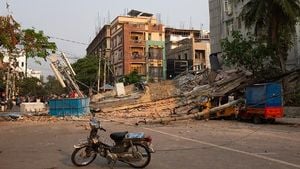Choi Yoon-hong, a candidate for the Busan Superintendent of Education, has reported that his mobile phone was hacked, prompting him to file a police complaint on March 26, 2025. According to Choi and the Busan Jin Police Station, the incident occurred on March 25 at approximately 12:16 PM, when Choi discovered that his phone had been compromised.
The campaign committee for Choi Yoon-hong revealed that the hacker sent a Telegram message to one of Choi's acquaintances, claiming they needed to urgently transfer money due to losing their one-time password (OTP) card. The message read, "I urgently need to transfer money to a friend, but I lost my OTP card. Can I ask for your help with the transfer?" This alarming development raised concerns about the integrity of Choi's campaign, as the committee stated that the hacking incident could severely hinder his campaign activities and damage his public image.
Choi's campaign committee emphasized that such actions are clearly criminal and suggested that this could be a planned attack aimed at tarnishing the candidate's reputation during the election period. They expressed their belief that the incident was not merely a random act but rather a calculated effort to disrupt Choi's election campaign.
In response to the hacking, Choi's campaign committee immediately filed a complaint with the Busan Jin Police Station, urging authorities to investigate the matter thoroughly. They also issued a warning to the campaign team to be vigilant against similar incidents in the future, highlighting the importance of cybersecurity in political campaigns.
Choi Yoon-hong's situation reflects a growing concern among political candidates about the vulnerabilities posed by technology in modern campaigns. As elections become increasingly digital, the potential for cyberattacks and misinformation campaigns has raised alarms across the political landscape.
Political analysts note that the integrity of communication channels is crucial for candidates, especially during sensitive periods like election campaigns. The rise of digital communication tools has made it easier for hackers to exploit weaknesses, leading to potential disruptions in candidates' operations.
Choi's campaign team has called for increased awareness and security measures within their ranks to protect against such attacks. They have stated, "We are taking this incident very seriously and will do everything in our power to ensure that our communications remain secure and that our campaign can proceed without further interruptions."
As Choi Yoon-hong prepares for the upcoming election, the implications of this hacking incident may extend beyond his immediate campaign. It raises questions about the broader security measures that political candidates must implement to safeguard their operations and maintain public trust.
In a world where cyber threats are becoming more sophisticated, candidates like Choi are faced with the daunting task of not only campaigning effectively but also protecting their digital presence. This incident serves as a stark reminder of the potential risks involved in running for office in an increasingly interconnected world.
As the investigation unfolds, the Busan Jin Police Station has assured the public that they are taking the matter seriously and will work diligently to identify the perpetrator. The police have urged anyone with information related to the hacking incident to come forward and assist in the investigation.
Choi Yoon-hong's campaign will likely adapt its strategies in light of this incident, prioritizing cybersecurity and communication safety as they move forward. The candidate's ability to navigate this challenge could impact not only his campaign but also set an example for future candidates facing similar threats.
As the election date approaches, the focus will remain on Choi's response to this hacking incident and how it may influence voter perception. Will this breach of security harm his chances at the polls, or will it galvanize support among constituents who sympathize with his plight?
Regardless of the outcome, Choi's experience highlights the urgent need for political candidates to prioritize cybersecurity in their campaigns. With technology playing an increasingly pivotal role in elections, safeguarding communications and data has become a vital aspect of modern political strategy.
In conclusion, as political campaigns continue to evolve in the digital age, the lessons learned from Choi Yoon-hong's experience may resonate throughout the political landscape, prompting candidates to reevaluate their own security measures and preparedness against cyber threats.





